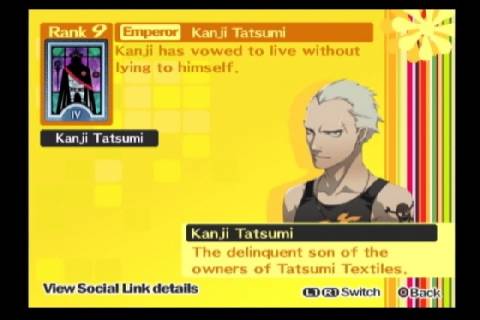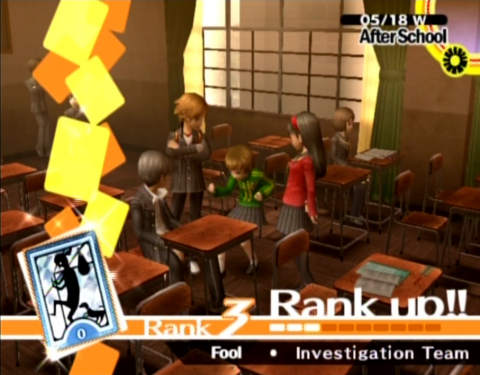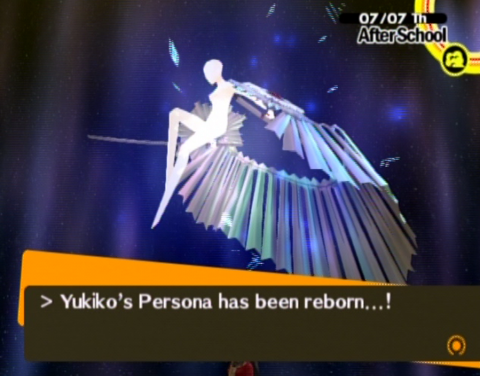A Close Look at Social Links and their functions in Persona 4
By thatpinguino 15 Comments

Persona 4, published by Atlus, is a role-playing game with an odd pedigree; it draws inspiration from two distinct game genres: the traditional Japanese role-playing game and the Japanese dating simulation. Although, this combination of genres may appear at first to be some sort of unholy union, Persona 4 blends the constant progression and incentivization mechanics of role-playing games with the character interaction mechanics of a dating simulation to create a game with a very specific focus. Through the blending of genres, Persona 4 becomes a game which uses traditional rpg mechanics to incentivize social interaction rather than combat or traditional role-playing game character building. In Persona 4 the player is rewarded more for forming Social Links with the various characters in the game than for fighting enemies, earning money, or buying new weapons. What is truly significant and remarkable about this game, however, is not merely its focus on social interaction and ordinary human activity, but that it does not force these interactions upon the player. The player may, if she/he wishes, play the game completely ignoring the Social Links and ignoring the rewards there in. It is up to the player to realize that the most efficient and gratifying way to play the game is to spend as little time fighting monsters as possible and instead spend time joining the school basketball team or taking up a part-time job at the hospital. Through the use of strong incentivization and interesting characters, Persona 4 mounts a campaign to convince the player that what is truly meaningful in a world full of murder investigations and TV monsters is spending a Sunday afternoon listening to a grieving widow down by the riverbank.

Social Links in Persona 4 provide the player with several in-game benefits that in other games would be tied to a traditional, combat based, leveling system. Upon establishing a Social Link with a character in Persona 4, the player immediately receives an experience bonus whenever he/she fuses a persona that corresponds to that Social Link. This experience bonus increases as the player increases the level of their Social Link through interaction and socialization. As a result, this experience bonus can become quite substantial over time. Towards the middle of the game, due to this experience bonus, the player is able to immediately level-up a newly fused persona by several levels and, in doing so, allow that persona to rapidly accrue abilities and stat bonuses. This single experience boost can remove the need for hours of combat and leveling, as the player’s personae can often learn every ability it is capable of learning immediately after it is fused. Therefore, a concerted focus on increasing the level of one’s Social Links allows for a reduction in the number of hours of level grind in the game. However, rather than simply removing an unnecessary grind from the game, the experience bonus provided by Social Links replaces the combat grind with a social one. Instead of rewarding endless hours of combat in dungeons, Persona 4 rewards players who actively seek friends in the game. Players are rewarded with faster persona growth when they spend their in-game days out of the TV, rather than in it.
Social Links also serve as a motivator for personal growth in Persona 4. Over the course of the game the main character can increase several personality traits, namely: diligence, courage, knowledge, understanding, and expression. All of these character traits represent desirable qualities for a human being and, as such, it is unsurprising that the game incentivizes the player to make the main character as well rounded an individual as possible. However, the way the game incentivizes his personal growth is not through the promise of statistical rewards or combat benefits. Instead, the player is presented with social links that cannot be established until certain levels of personal growth are met. For example, Naoto’s social link, an essential social link for any player who intends to use Naoto in combat, is blocked off until the main character has level five knowledge. In this case the main character is not only encouraged to be intelligent, but the reward for intelligence is first and foremost a social one. All of the personality traits in Persona 4 are treated in a similar fashion and as a result the player is shown that traits such as knowledge and courage are not necessarily useful in and of themselves. On the contrary, these traits are only as useful as the relationships that they allow you to pursue.

The final aspect of Social Links that I wish to touch on is their ability to affect permanent change on the characters in the investigation team. Each of the investigation teammates level up and gain abilities through combat; they accrue experience points after each victory and those points allow them to level up and gain new abilities. However, there are levels of growth that each character can only attain though Social Links. In fact, certain team based abilities can only be unlocked by socializing with the members of the investigation team, such as follow-up attacks. Follow up attacks can completely change the way that the player approaches battles as characters like Yukiko and Teddie gain the ability to dizzy opponents after a knock down and Chie gains the ability to instantly kill one opponent. Each of these follow up attacks add options to the battles in Persona 4 that are completely unique and can change the strategy of combat fairly significantly. Furthermore, to gain these combat advantages as well as the investigation team’s evolved personas the player must choose to forgo the TV world for weeks of game time. The player must make a conscious effort to prioritize socializing over the fantasy world of the TV. Also these added bonuses that the investigation teammates receive further incentivize the player to prioritize these teammates over the other Social Links in the game. Rather than taking the ordinary rpg tact of leveling characters based purely on using those characters in combat, Persona 4 elects to instead reward players for getting to know the characters on a more human level.
What makes Persona 4s rpg mechanics so interesting for me is that the Social Link system allows the game developers to take ordinary rpg leveling and incentive systems and blend them with something resembling reality. The player is rewarded with fantastical things like experience points and elemental bonuses for studying after school and for participating in school clubs. Furthermore, these bonuses always come at the expense of another day in the TV. To get the best results in Persona 4, a proper balance must be stuck between entering the TV world and socializing. It seems to me that this game is both making a statement about balancing fantasy and reality while also showing a way to season reality with aspects of fantasy. This blending of fantasy and reality, thus, makes reality into something more interesting and exciting than it otherwise might be. Yet, what is always most important is social interaction, without it none of the fantastical rewards can be reaped.
